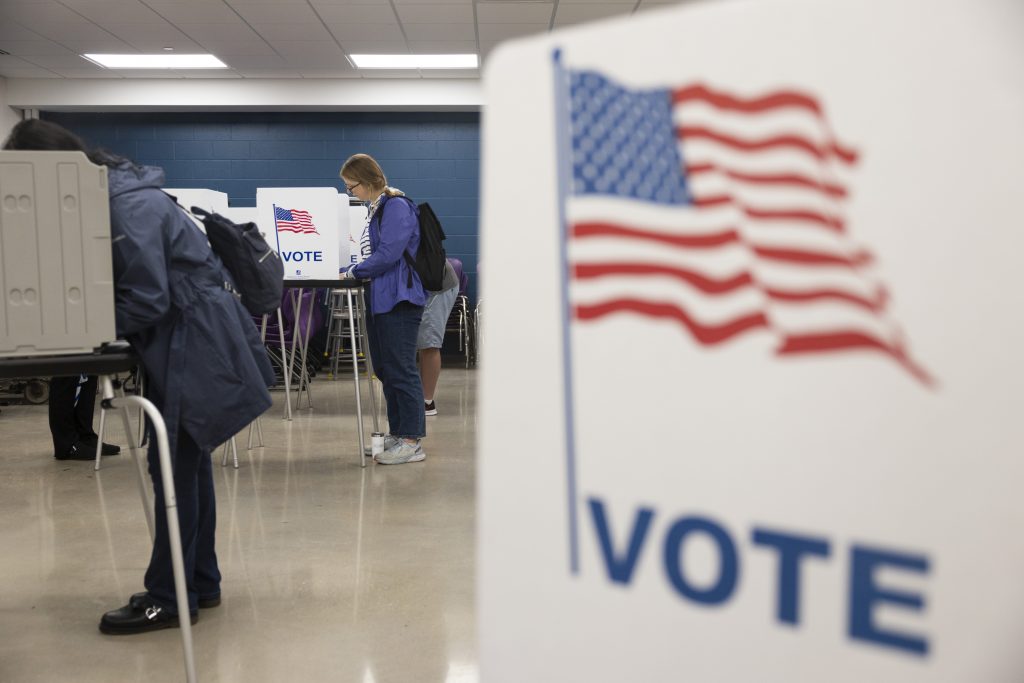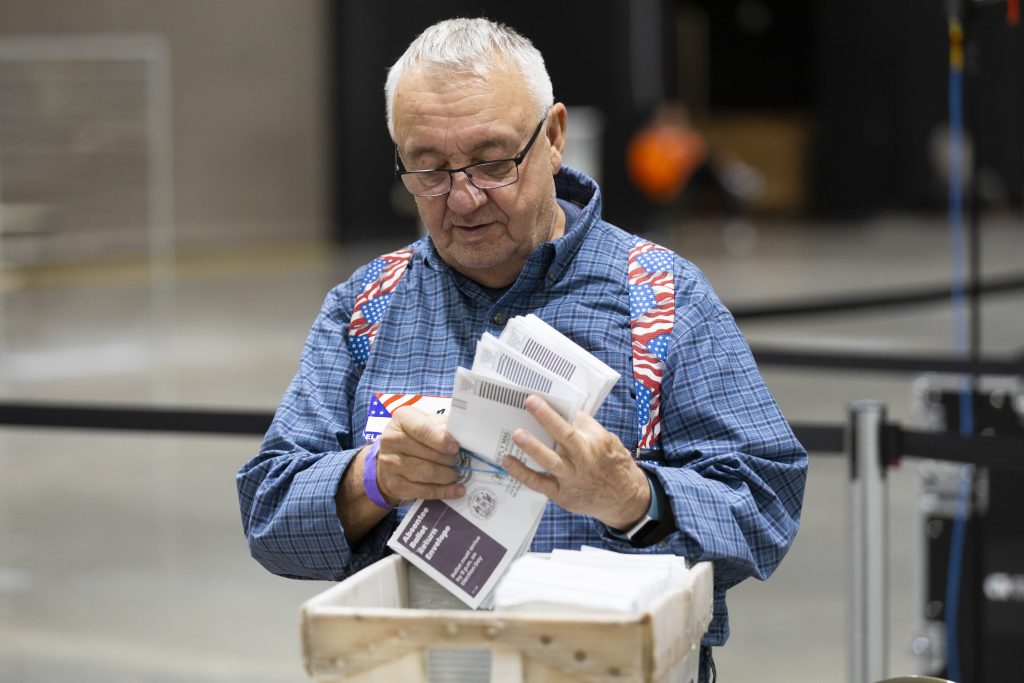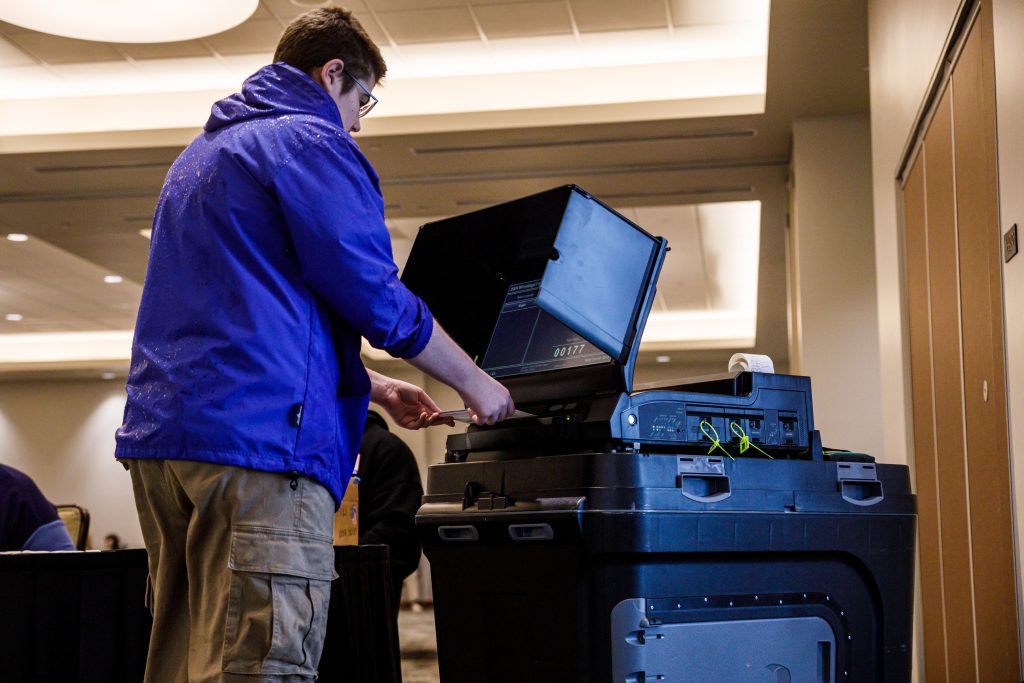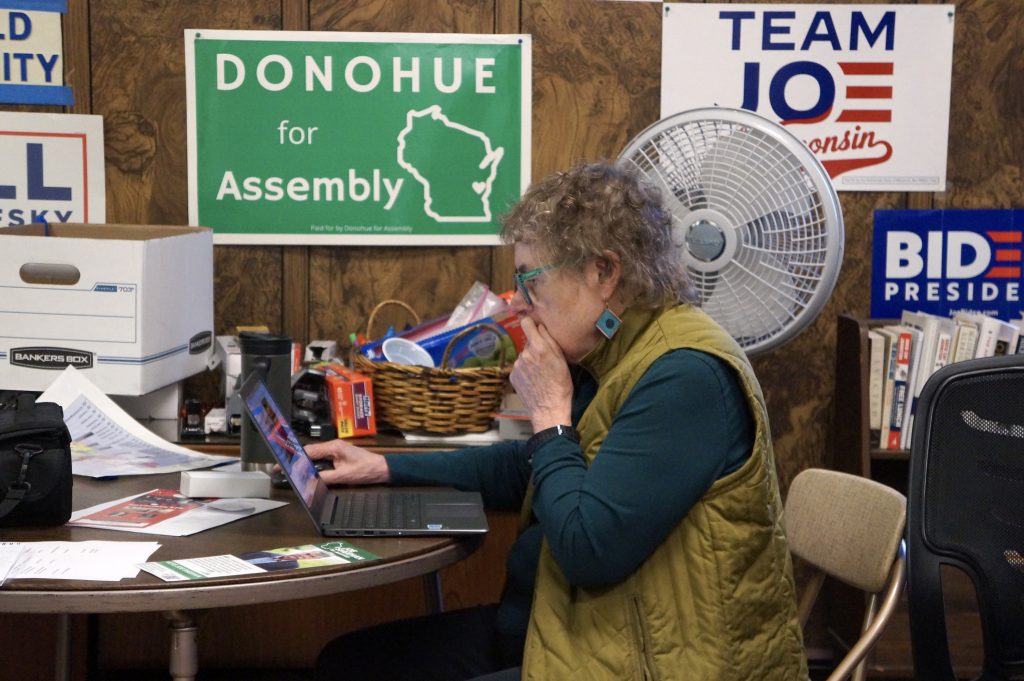Without Gerrymander, Democrats Flip 14 Legislative Seats
The Democratic gains in a strong Republican year set up a chance for them to win majorities in 2026.

Jennifer Taylor, left, votes during Election Day on Nov. 5, 2024, at Madison East High School in Madison, Wis. (Joe Timmerman / Wisconsin Watch)
This story was produced and originally published by Wisconsin Watch, a nonprofit, nonpartisan newsroom. It was made possible by donors like you.
Wisconsin Republicans held on to the state Legislature in Tuesday’s election, but the flipping of 14 Senate and Assembly seats from red to blue provided the clearest evidence yet that the 2011 partisan gerrymander was real and is now dead.
Republicans will maintain majorities in both the Assembly and Senate — though at much slimmer margins than during the most recent legislative session. The math sets up a chance for the Democrats to retake at least one chamber in 2026, especially if Republicans face the usual midterm headwinds that check a new president.
The Democratic gains in an election environment favoring Republicans provided further evidence that Wisconsin’s Republican governor and Legislature in 2011 designed maps to allow their party to keep legislative control no matter how much statewide sentiment might change. The party re-upped those maps after the 2020 Census with help from the then-conservative Wisconsin Supreme Court.
The results show that “when people have a real choice at the ballot box, that they’re going to choose the person that best represents their values and the policies they want to see going forward,” Senate Minority Leader Dianne Hesselbein, D-Middleton, told Wisconsin Watch in an interview.
Entering the next election cycle, state Senate Democrats will hold 10 guaranteed seats (they were elected Tuesday) and be favored in six of the 17 seats up for election in 2026. That’s according to an analysis of past voting patterns in state Senate districts that does not yet include 2024 results. By comparison, Republicans will hold just six guaranteed seats while being favored in nine districts up for election in 2026.
That will leave both sides battling for two toss-up districts — currently held by GOP Sens. Van Wanggaard, R-Racine, and Rob Hutton, R-Brookfield — to determine control of the chamber. On Tuesday, Democrats won two of the three Assembly seats in Hutton’s district.
In the state Assembly, where Democrats hoped new maps would help them win a majority, Republicans won 54 seats, according to unofficial returns, while Democrats captured 45 seats. That marks a 10-seat swing from the previous legislative session, when Assembly Republicans were just shy of the votes needed to override a gubernatorial veto.
That’s a remarkable outcome given Republican candidates almost across the board performed better than the historical GOP candidate averages in their districts. By comparison, Democrats performed worse in relation to the historical partisan makeup in 68 of the state’s 99 Assembly districts, according to a Wisconsin Watch analysis of past voting patterns and unofficial results. On average Republican candidates in competitive races ran 3.6 points ahead of the historical GOP average, while Democrats ran 2.3 points behind.
Incumbency also helped. Though Democrats unseated three Assembly incumbents, Republican incumbents outperformed the past voting trend of their new district by an average of 4.27 points, compared with 3.14 points of those who had never held office. Lawmakers with three or more terms under their belts like Reps. Tony Kurtz, Todd Novak, Travis Tranel and Nancy VanderMeer outperformed their district averages by more than 8 points.
“Things are going to change in the Legislature,” Assembly Minority Leader Greta Neubauer, D-Racine, said in a Wednesday statement. “Fair maps have allowed voters to hold legislators accountable, and this will change how policy is written and what bills move through the Legislature.”
Some Republicans on Wednesday downplayed the Democratic gains.
“(Democrats) spent weeks and months talking up trying to take over at least the Assembly and they didn’t, frankly, come close to doing it, including losing some of the key races,” said Republican Party of Wisconsin Chair Brian Schimming. “The truth of the matter is, they had their one moment when they had a huge turnout to take over this year, and they failed in both houses.”
“Majorities matter in the Legislature,” he added.

An election worker counts ballots on Election Day, Nov. 5, 2024, at Milwaukee Central Count at the Baird Center in Milwaukee. (Joe Timmerman / Wisconsin Watch)
Speaking to reporters at the Capitol, Assembly Speaker Robin Vos, R-Rochester, declared Republicans would not compromise with Democrats if it meant “expanding welfare, having boys play girls sports and all the craziness that the national Democratic Party stands for,” WisPolitics.com reported.
Republicans will also have a chance to pick up seats in two years, Vos said.
Assembly Democrats lost five races on Tuesday in districts with a Democratic edge, including Novak’s in southwest Wisconsin that carries a 13-point Democratic advantage based on past election results. Republicans won all districts in which they have an edge. Among the 14 toss-up districts, those with less than a 10-point spread based on past election results, Democrats won five and Republicans won nine.
Sheboygan Democrat defeats GOP incumbent in reunited city
In Sheboygan, local Democrats celebrated on Election Night as the majority blue city elected a local Democratic candidate to state office for the first time in over a decade.
Former Sheboygan Area School District superintendent Joe Sheehan defeated freshman Rep. Amy Binsfeld, R-Sheboygan, under new legislative maps that reunited the 26th Assembly District after the 2011 redistricting process blatantly split the city in half, extending to surrounding rural areas to secure two Republican seats. Sheehan, whose campaign slogan was “together again,” led Binsfeld by less than 900 votes, according to unofficial results.
But fair maps meant the candidates actually had to get out and earn the vote, Sheboygan Mayor Ryan Sorenson told Wisconsin Watch, saying it strengthened the democratic process in their “light blue city” where the seat wasn’t completely safe.
“We realized the cards were really stacked against us when we had local representation because of the city being cut in half,” Sorenson said. “Sheboygan is the urban center for the county. When you loop us in with small, rural communities that are 45 minutes away, it really dilutes our voice.”
Sheboygan County Democratic Party co-chair Mary Lynne Donohue, who ran for the district in 2020 as a “sacrificial lamb,” told Wisconsin Watch the new maps had been a “rallying cry.” Both Quinn and Donohue noted their office saw far more volunteers, distributed signs and campaign surrogates this cycle than in previous election years, with over 40 door-knocking volunteers stopping in on both Saturday and Sunday before Election Day, they said.
“This place was like a ghost town in 2022,” Donohue said.

UW-Oshkosh student Theodorus Guigley casts a ballot. Students and community members voted at the Culver Family Welcome Center at UW-Oshkosh in Oshkosh, Wis., on Nov. 5, 2024. (Julius Shieh / Wisconsin Watch)
The heightened energy is a sign of revival after 13 years of gerrymandering dampened the democratic process in places like Sheboygan all across the state.
Get-out-the-vote volunteers continued to filter into the office on Election Day, including Bryan Cones and Mike Schoen, who came from Chicago to knock on doors in Sheboygan for Democrats up and down the ballot. Cones, originally from Tennessee where Republicans have gerrymandered districts around Nashville, understands how skewed maps make people feel like their vote doesn’t count.
Donohue was one of the original plaintiffs in a federal redistricting case that challenged the Republican gerrymander of the state Assembly. The U.S. Supreme Court threw out the case on a technical issue. In a more recent legal challenge, a liberal-majority Wisconsin Supreme Court tossed out the state’s Republican-friendly 2020 maps, leading to lawmakers in both parties to approve today’s more balanced maps.
Sheehan’s campaign raised nearly $1.3 million to Binsfeld’s $330,000, with the Democratic Assembly Campaign Committee and the Republican Assembly Campaign Committee investing heavily in each race.
Binsfeld had a falling out with the Sheboygan County GOP earlier this year after she distanced herself from its anti-abortion stance and member concerns about election integrity, according to party chair Russ Otten. The GOP refused to distribute her campaign signs, and Otten predicted she would fall short in the race without local party support.
In stark contrast with Donohue’s ill-fated 2020 campaign, which raised $75,000, Sheehan told Wisconsin Watch he knocked on over 4,000 doors in the district, where voters shared their enthusiasm for his chances.
“That’s incredible that we got a voice, and now we can talk about some of the issues that really affect Sheboygan, which gerrymandering did not allow,” Sheehan said in an interview.

At the Sheboygan County Democratic Party headquarters on Nov. 5, 2024, local party co-chair Mary Lynne Donohue sits at her computer. Donohue ran for Assembly in 2020 as a “sacrificial lamb” because she lived in a Sheboygan district that had been gerrymandered to prevent Democrats from winning. On Tuesday her party won the new Sheboygan district made possible by new legislative maps. (Hallie Claflin / Wisconsin Watch)
End note: The polls were right
Republicans celebrated the continued legislative majorities alongside Trump’s victory in the state and nationally. Democrats breathed a sigh of relief as Sen. Tammy Baldwin eked out a win to secure a third term.
The results also brought relief to Marquette University Law School poll director Charles Franklin. The final Marquette poll had both races in a statistical tie with Kamala Harris up by a point and Baldwin up by two. Trump in fact won by 0.8 points and Baldwin won by 0.9 points — well within the poll’s margin of error.
“We missed the president by 1.9 points and the Senate by 1.1 points, better than our 2.2 average error,” Franklin told Wisconsin Watch in an email. “So I get to keep my job.”
The final RealClearPolitics polling average had Harris up 0.4 points and Baldwin up 1.8 points. FiveThirtyEight had Harris up by 1 point and Baldwin up 2.2 points.
If you think stories like this are important, become a member of Urban Milwaukee and help support real, independent journalism. Plus you get some cool added benefits.
More about the Gerrymandering of Legislative Districts
- Without Gerrymander, Democrats Flip 14 Legislative Seats - Jack Kelly, Hallie Claflin and Matthew DeFour - Nov 8th, 2024
- Op Ed: Democrats Optimistic About New Voting Maps - Ruth Conniff - Feb 27th, 2024
- The State of Politics: Parties Seek New Candidates in New Districts - Steven Walters - Feb 26th, 2024
- Rep. Myers Issues Statement Regarding Fair Legislative Maps - State Rep. LaKeshia Myers - Feb 19th, 2024
- Statement on Legislative Maps Being Signed into Law - Wisconsin Assembly Speaker Robin Vos - Feb 19th, 2024
- Pocan Reacts to Newly Signed Wisconsin Legislative Maps - U.S. Rep. Mark Pocan - Feb 19th, 2024
- Evers Signs Legislative Maps Into Law, Ending Court Fight - Rich Kremer - Feb 19th, 2024
- Senator Hesselbein Statement: After More than a Decade of Political Gerrymanders, Fair Maps are Signed into Law in Wisconsin - State Senate Democratic Leader Dianne Hesselbein - Feb 19th, 2024
- Wisconsin Democrats on Enactment of New Legislative Maps - Democratic Party of Wisconsin - Feb 19th, 2024
- Governor Evers Signs New Legislative Maps to Replace Unconstitutional GOP Maps - A Better Wisconsin Together - Feb 19th, 2024
Read more about Gerrymandering of Legislative Districts here





















oh, is there going to be another election cycle????